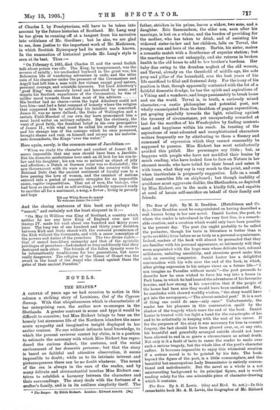NOVELS.
THE REAPER.*
A COUPLE of years ago we had occasion to notice in this column a striking story of Louisiana, Out of the Cypress Swamp. With that ubiquitousness which is characteristic of her enterprising race, the author now re-emerges in the Shetlands. A greater contrast in .scene and type it would be difficult to conceive; but Miss Rickert brings to bear on the homely but strenuous life of the Northern islanders the same acute sympathy and imaginative insight displayed in her earlier venture. No one without intimate local knowledge, to which the present reviewer cannot lay claim, is in a position to estimate the accuracy with which Miss Rickert has repro- duced the curious dialect, the customs, and the social environment of her dramatis personae; but that the story is based on faithful and attentive observation, it seems impossible to doubt; while as to its intrinsic interest and picturesqueness there can be no doubt whatever. The sound of the sea is always in the ears of the reader, and by many delicate and circumstantial touches Miss Rickert con- trives to establish a harmony between the characters and their surroundings. The story deals with the fortunes of a crofter's family, and is in its outlines simplicity itself. The • The Beam. By Edith Rickert. London: Edward Arnold. pa] father, stricken in his prime, leaves a widow, two sons, and a daughter. Eric Saemundson, the elder son, soon after his marriage, is lost on a whaler, and the burden of providing for the mother, who has taken to drink, and of assisting his widowed sister-in-law and her children, falls on Terval, the younger son and hero of the story. Barbie, his sister, makes a romantic match with a Southerner of superior station; but the marriage turns out unhappily, and she returns in broken health to the old home to add to her brother's burdens. Her baby dies owing to the drunken neglect of the old woman, and Terval, already on the threshold of middle age, the sole prop and pillar of the household, sees the best years of his life sacrificed to filial and fraternal duty. For the irony of his position is that, though apparently contented with the lot of a faithful domestic drudge, he has the spirit and aspirations of a Viking and a wanderer, and longs passionately to break loose and see the world. Terval is, in truth, a curiously mixed character,—a rustic philosopher and potential poet, not wholly emancipated from the thraldom of pagan superstition, yet groping painfully towards the light, rebelling against the tyranny of circumstance, yet unexpectedly rewarded at last for the sacrifice of his Wand,erjahre by finding content- ment and happiness within his reach. In treating of the aspirations of semi-educated and unsophisticated characters writers frequently err by attributing to them a. fluency and command of expression which they cannot reasonably be supposed to possess. Miss Rickert has most satisfactorily avoided this pitfall. Her personages say little ; but, as happens with people who have not muddled their brains by much reading, who have looked face to face on Nature in her sternest moods, who have toiled for their bread and eaten it with tears, what they say is very much to the point, and even when inarticulate is poignantly suggestive. Life on a small island resembles life on shipboard ; but though inability of avoidance must aggravate dislike, the Shetlanders, as depicted by Miss Rickert, are in the main a kindly folk, and capable at need of heroic self-sacrifice on behalf of their family and friends.






































 Previous page
Previous page